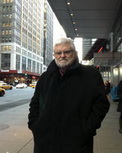 Chris
McDonnell, UK
Chris
McDonnell, UKchristymac733@gmail.com
 Chris
McDonnell, UK
Chris
McDonnell, UK
christymac733@gmail.com
Previous articles by Chris Comments welcome here
April 11, 2018
Walk with me

"Morning and first light in the garden,
brings shadows of women moving.
Turning, they did not recognise in this Springtime Pasch,
the Nazarene passing over into Galilee.
Contained in the finger space of the morning dawn,
the Resurrected Christ greets us.
Rabboni, we did not trust you,
we did not understand.
We thought it was over.
'No my people, it has just begun'."
These words are taken from 'Walk with Me', the 15th Station, 'Resurrection'; published by McCrimmon. We are now in those days when it has just begun, days that started on the Sunday after Passover with an early morning empty tomb and two shaken men walking a dusty road to an evening meal in Emmaus.
The descriptions of encounters with the Risen Christ are of a different order to earlier accounts in the Gospel narratives. Now the Christ comes and goes with apparent ease and when he is present it is often in the social circumstance and reality of a meal.
The story of the road to Emmaus, his conversation with companions on a journey and their final recognition of who he is in the Breaking of Bread, is one of the most beautiful stories in the New Testament. Not only does it tell the story of his revelation but also of their realisation of who it is breaking Bread at their table.
In these few days after that Sunday morning we must ask ourselves who breaks bread at our table and what is our response? We forget the significance of that easy phrase ' the breaking of bread' . Convenience and recent custom has meant that this sharing is through the consecration of small altar breads. The only breaking that takes place is that the larger bread received by the priest.
We have lost the significance of the action of breaking, the physical distribution of the one loaf, the sharing, one with another, of the Eucharistic Christ. One way to emphasise this action would be to use only the larger altar breads so that all will receive a fragment from a larger whole. It is important that we recognise that we not only receive the Risen Christ but share that experience with each other.
In recent weeks there has been much discussion of the views expressed by Cardinal Sarah on the manner of receiving the Eucharist. As head of the Vatican department overseeing liturgical practice, his views cannot be ignored. That makes his insistence that we receive on the tongue and when kneeling even more worrying. No-where is that practice found in scriptural accounts of Eucharistic celebration. To suggest that our practice of receiving with open hands whilst standing is contrary to our acknowledgement of the Real Presence is absurd.
Writing on the Praytell website in the US, Fr Anthony Ruff OSB makes this point. 'I can see why, in the entire history of the Church, there has been very little administration on the tongue. When lots of people received, it was in the hand. By the time tongue-reception came in, almost nobody went to Communion, ever. It was a very, very short period of maybe a few years or decades before 1960 when people in greater number received more frequently and on the tongue. That is a historical anomaly.'
To be critical of Reception in the hand whilst standing does no favour to faith. The significance of the post-Resurrection appearances is their very 'ordinariness' whether it is on the beach where the fishermen were invited to share breakfast by the Lord who had a fire waiting for their catch, or in the Upper Room, or at supper in Emmaus.
Our recognition of the Christ's presence in the Breaking of Bread is a matter of faith that goes way beyond posture and being fed by another with our mouths wide open. The Eucharist is placed within the centrality of our humanity, a table shared with friends, the necessity of nourishment. Those words 'do this in memory of me' are very clear and they were spoken at a Passover meal while all were still gathered.
In charity, those who wish to receive on the tongue should not be refused nor should our open hands be ignored. The day after the death of John Paul I, I attended mass in a Catholic High School. At Communion time my open hands were refused and it was made very clear that there was only one way I might receive. It was an experience I have not easily forgotten.
So in these days framing as they do Eucharistic experiences, let us in conscience, keep a balanced view. Hands that bless and break the body of Christ distribute to those who stand round the altar their share of his Presence. With open hands we greet each other and welcome the Lord into our presence. The Lord is Risen indeed.
END
====